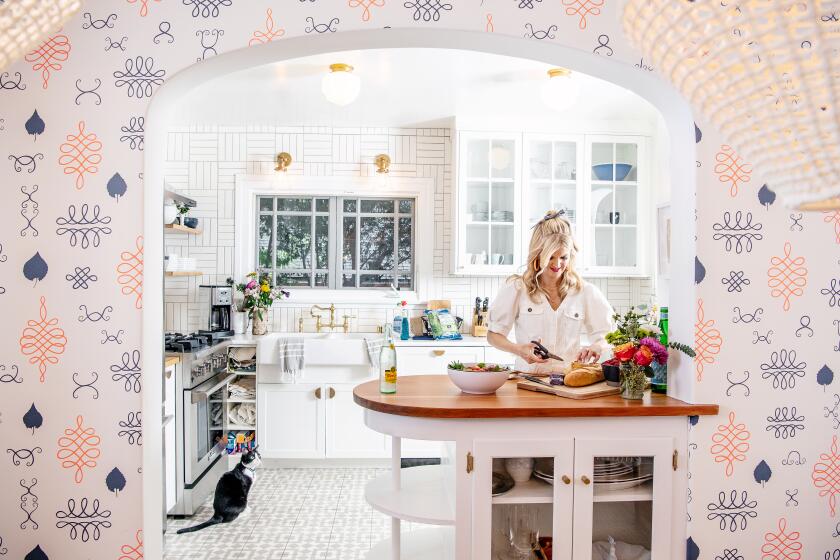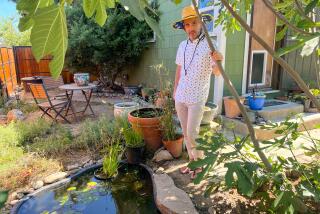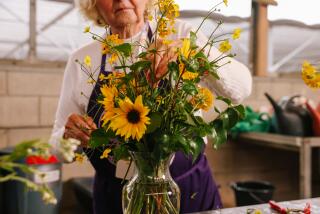The 10 best hanging plants for creating an indoor jungle

- Share via
A longtime bohemian standard during the 1970s, hanging houseplants have returned in a big way as demand for plants has skyrocketed in the pandemic and Instagram influencers flaunt their indoor jungles.
Plant parents love to dote on their houseplants, especially now that everyone is hunkering down at home, but are all indoor plants well suited to hanging?
Bloomscape’s resident plant expert Joyce Mast advises evaluating your home and lifestyle before choosing a houseplant to hang.
Get The Wild newsletter.
The essential weekly guide to enjoying the outdoors in Southern California. Insider tips on the best of our beaches, trails, parks, deserts, forests and mountains.
You may occasionally receive promotional content from the Los Angeles Times.
“What kind of light will your plant enjoy?” Mast asked. “How much time will you have to take care of its needs? And are you able to reach the plant (to water) once it is hanging in your home?”
From fast-growing philodendrons to trailing spider plants, here are varieties that will do well in baskets and macrame hangers. Have a favorite? Tag us at #latimesplants and we’ll feature your photo on our @latimesplants Instagram account.
Thirsty? Lack of light? Need to get rid of gnats? Here are the answers to the most frequently asked questions about houseplants.
1. Silver satin pothos (Scindapsus pictus)
In the wild, a Scindapsus plant can climb as high as the crown of a tree, while indoors, it can grow up to 6 feet. “This trailing plant enjoys low to bright indirect light areas, is very easy to care for, and looks lovely as a hanging plant as its patterned silvery-green leaves drape over,” Mast said. Tip: Take a cutting from this one and share at plant swaps as they are easy to propagate. If vines grow too long, simply cut back the stems in the spring just below a healthy leaf.
2. Heartleaf philodendron (Philodendron hederaceum)
This popular philodendron features distinctive pointed tips and can be grown as a climber or a trailing vine. “These fast-growing heart-shaped plants enjoy low to bright indirect light areas and are very easy to care for; they’re happy in most areas of the home,” said Mast. Tip: This plant can handle its soil drying out from time to time. Just water it thoroughly and then hang it back up. As a quick grower, it is an excellent choice for the trailing-plants-as-curtains look.
3. Philodendron hederaceum ‘Brasil’
This variety of the popular heartleaf philodendron features beautiful yellow and lime green leaves that look dramatic cascading from bookshelves and hangers. Mast likes it as a “fast-growing, vining plant that is very easy to care for and will thrive in low to bright indirect light.” Tip: If it gets long and leggy, simply pinch it back for a fuller look.
Cactus, succulents, herbs, dwarf citrus and other houseplants that can handle the summer heat.
4. Neon prayer plant (maranta)
Hardy maranta earned its common name because of the way its leaves close at nightfall. “This vibrant plant stands out with bright green oval leaves and a herringbone-like pattern of light yellow veining,” said Mast. “The colorful foliage makes this a perfect plant for window sills or shelves that need a splash of color.” Tip: Maranta thrives in humid conditions, so it’s a good idea to give it a light mist every few days.
5. Wandering dude (Tradescantia zebrina )
This striking purple plant, now commonly known as the Wandering dude plant, is easy to care for and fast-growing and will trail quickly. It can also take some direct sunlight if necessary. Tip: Pinch back the long vines at a joint on the stem to encourage branching as it can become leggy with bare stems. Because it is a plant that prefers a slightly more humid environment, this is a good choice for bathrooms and kitchens.
Arden Myrin’s ‘cheap and cheerful’ tiny bungalow will cure your COVID-19 blues.
6. Hoya obovata
Hoyas have thick, waxy leaves, are great climbers and prefer bright, indirect light. With their striking trailing leaves, hoyas are perfect for bookshelves, mantels and hangers. Tip: Group a variety of hoyas in a row (other popular varieties include Hoya kerrii and Hoya carnosa) to make a statement, as shown above.
7. String of bananas (Curio radicans)
Native to South Africa, this succulent features distinctive banana-shaped foliage, also known as “fish hooks,” and is a good choice for sun-drenched south-facing windows. Tip: String of bananas is prone to aphids, so watch the tips of the plants for insects.
8. String of pearls (Curio rowleyanus)
String of pearls, formerly known as Senecio rowleyanus, is a popular trailing plant with pea-shaped leaves. It loves heat and indirect sunlight but can tolerate lower light if necessary. As a drought-tolerant succulent, water string of pearls when the soil is dry. Tip: The attractive stems can break off easily, so install it in a place with limited traffic.
Black Raven ZZ plants for Aquarius. Fiddle-leaf figs for Taurus. How to pair houseplants with your sun sign.
9. Spider plant (Chlorophytum comosum)
Spider plants, sometimes called airplane plants because of their arching leaves and floating plantlets, grow well in hanging baskets. They prefer bright, indirect light, but too much sun can scorch their leaves. Water regularly and allow to dry out in between feedings. Tip: Propagate single plantlets by removing them from the stem and rooting them in water. When roots are an inch long, transfer them to potting soil.
10. Baby tears (Pilea depressa)
This delicate plant creates a stunning mat of creeping stems that prefer moist, well-drained soil in part to full shade. They are thirsty plants and require frequent watering. Tip: Baby tears thrive in humidity, so they are an ideal choice for steamy kitchens and bathrooms.
More to Read
Sign up for The Wild
We’ll help you find the best places to hike, bike and run, as well as the perfect silent spots for meditation and yoga.
You may occasionally receive promotional content from the Los Angeles Times.















